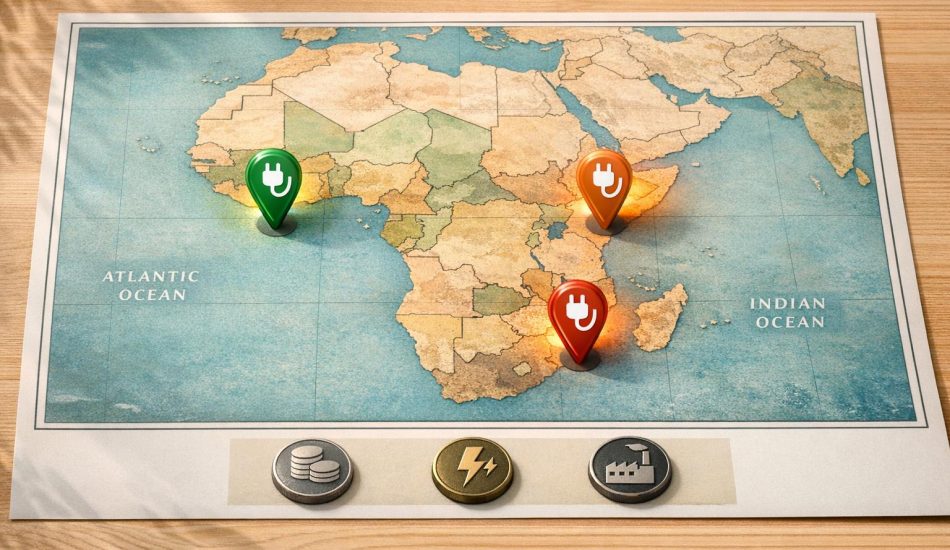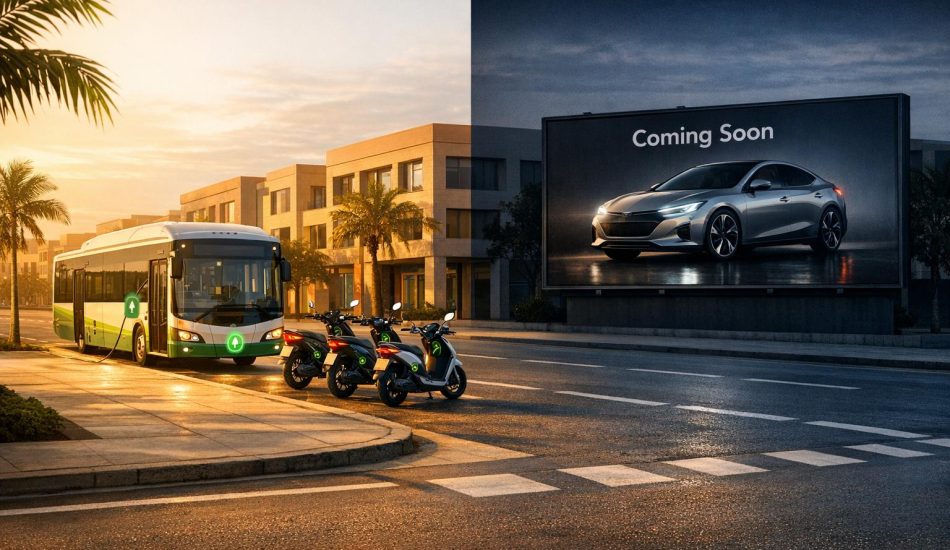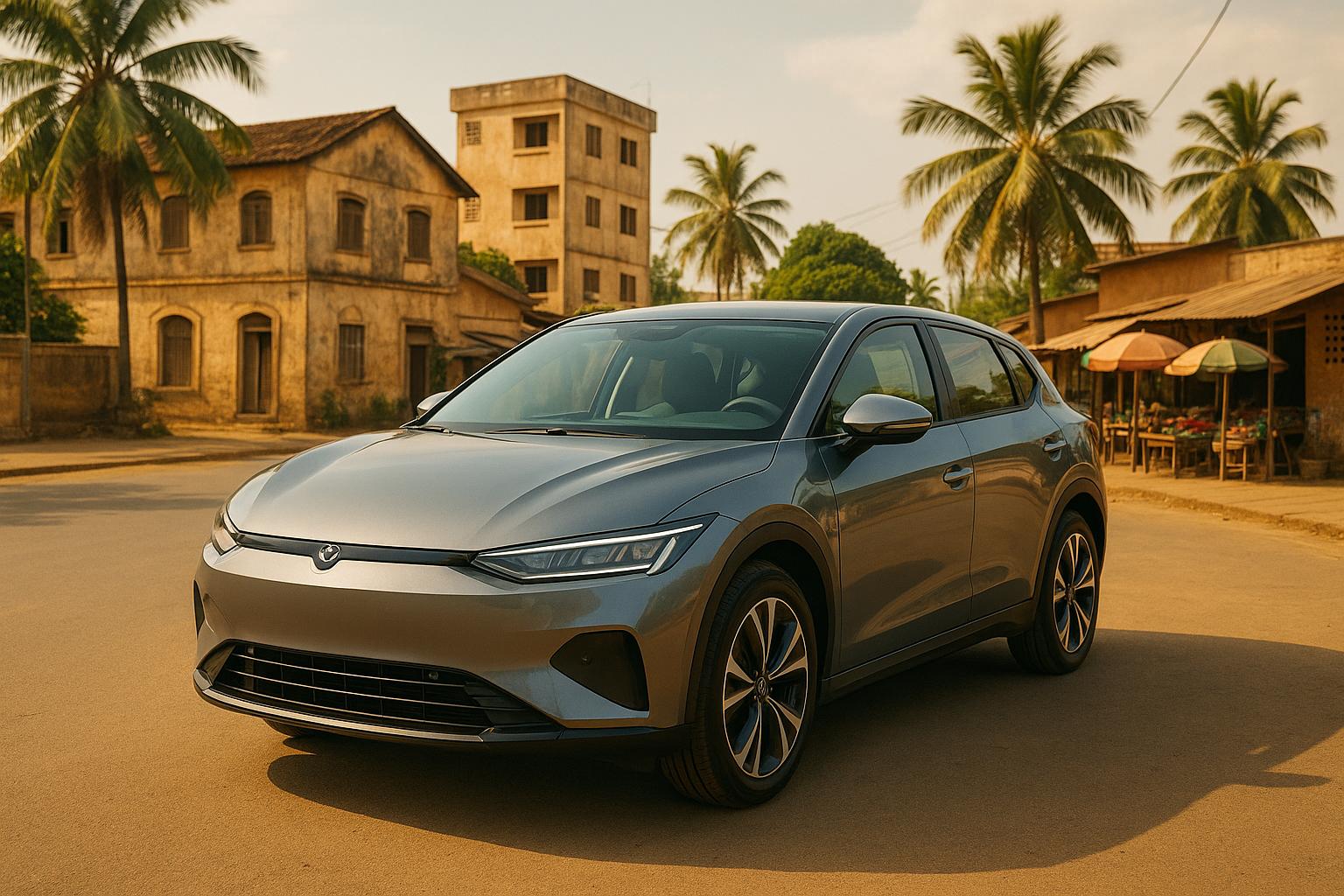
Looking for an electric vehicle (EV) in Togo? Here’s what you need to know:
- Government Incentives: Togo offers 100% tax exemptions on new EVs and 90% tax reductions for hybrids, making EVs more affordable.
- Growing EV Market: Togo’s passenger car market is projected to reach $22.8 million in revenue by 2025, with nearly 3,000 electric motorcycles already on the road.
- Infrastructure Challenges: Limited charging stations mean EVs with extended ranges are better for intercity travel, while compact models suit urban use.
- Top Picks: Affordable options like the Leapmotor T03, BYD Dolphin, and Hyundai Kona Electric are ideal for city driving, while the Tesla Model 3 and Toyota bZ4X offer longer ranges for diverse needs.
Quick Comparison
| Vehicle | Starting Price (USD) | Range (miles) | Best Use Case | Charging Time (DC Fast) |
|---|---|---|---|---|
| Tesla Model 3 | $44,130 | 272–358 | Premium, long-distance travel | ~30 minutes |
| BYD Dolphin | $15,000–20,000 | 211–265 | Budget-friendly urban driving | ~30 minutes |
| Hyundai Kona Electric | $34,425 | 258 | Compact SUV for families | ~45 minutes |
| Leapmotor T03 | $10,000–12,000 | 186 | Affordable city commuting | ~40 minutes |
| Toyota bZ4X | $38,465 | 228–252 | Reliable, moderate range needs | ~30–35 minutes |
Whether you’re looking for a budget-friendly city car or a high-performance EV, Togo’s incentives and growing infrastructure make this the perfect time to switch to electric. Read on to find the right EV for your needs.
How China is Driving EV Adoption in Africa
How to Choose an Electric Vehicle for Togo
As Togo moves toward electric mobility, selecting the right EV involves more than just picking a model – it requires understanding the country’s infrastructure, climate, import processes, and daily driving needs. Togo’s unique conditions and policies set it apart from other markets, making these factors essential to consider.
Understanding Togo’s EV Infrastructure and Range Needs
Togo’s developing charging network means range anxiety is a real concern. For intercity travel or areas with limited chargers, it’s wise to choose an EV with an extended range.
Currently, Togo’s charging infrastructure supports several charging levels:
- Level 1 chargers: Require 40–50+ hours for an 80% charge, making them unsuitable for daily use.
- Level 2 chargers: Need 4–10 hours to reach 80% capacity, offering a more practical solution.
- DC Fast Charging (DCFC): Can charge a battery to 80% in just 20 minutes to 1 hour, ideal for quick turnarounds.
When selecting an EV, ensure it is compatible with the available charging options in your area.
Climate and Its Impact on EV Performance
Togo’s tropical climate introduces challenges for EVs. High temperatures – those exceeding 95°F (35°C) – can reduce battery range by as much as 15%.
Maja Stefanovic highlights the importance of climate awareness:
"Understanding how temperature extremes affect EV performance is critical for anyone considering buying an electric car. By being aware of how hot and cold weather influences battery efficiency and range, drivers can take proactive steps to mitigate these effects."
To maintain performance in Togo’s climate, consider parking in shaded areas and charging your vehicle during cooler times of the day. Regularly checking the coolant levels in your EV’s battery cooling system can also help preserve battery health.
Import Logistics and After-Sales Support
Importing an EV to Togo involves more than just the purchase price. Shipping, customs duties, and delivery costs must all be factored in, even with government incentives that aim to make EVs more accessible.
Equally important is after-sales support. A reliable warranty can make all the difference. As Dien Do shares:
"The 10-year warranty made choosing the car an easy decision, and it provides additional peace of mind."
When purchasing through platforms like EV24.africa, prioritize models with strong warranty coverage and accessible customer support to ensure a smooth ownership experience.
Everyday Practicalities
Beyond technical specs, think about how the EV fits into your daily life. Consider battery range, terrain, and charging station availability when planning routes.
If you plan to use the EV for business or heavy-duty purposes, remember that the weight of the battery could impact the vehicle’s payload capacity. For longer trips, effective route planning is critical – you’ll need to account for both vehicle range and the location of charging stations.
With Africa’s EV market projected to reach $28.30 billion by 2030, choosing the right EV now not only meets your current needs but also positions you to benefit from this growing trend.
1. Tesla Model 3
The Tesla Model 3 is a standout electric sedan known for blending cutting-edge technology with impressive performance, making it a popular choice for modern urban mobility. This compact vehicle is praised for its efficiency, extended driving range, and access to Tesla’s growing charging network. Let’s break down its range, pricing, and suitability for local conditions.
Range (miles/kilometers)
The Model 3 offers three trims with varying ranges:
- Long Range RWD: EPA-estimated 363 miles (584 km)
- AWD: EPA-estimated 346 miles (557 km)
- Performance: EPA-estimated 303 miles (488 km)
Real-world highway tests provide additional insights. At 75 mph, the Long Range trim delivers around 310 miles (499 km), while the Performance model achieves approximately 260 miles (418 km).
A key feature of the Model 3 is its fast-charging capability. For instance, the Long Range RWD can gain up to 195 miles (314 km) of range in just 15 minutes at a Tesla Supercharger. This makes it a practical option for long trips, especially as charging networks continue to grow.
Pricing (USD and Estimated Import Cost)
The Tesla Model 3 is positioned as a premium electric vehicle, reflected in its pricing:
- Long Range: Starting at $42,490
- Performance: Starting at $56,630
These prices do not include import-related fees. Financing options are typically handled through third-party lenders, as Tesla does not provide direct financing. These price points are important when assessing the Model 3’s viability for markets like Togo.
Suitability for Togo (Urban/Rural Use, Road Conditions, Climate)
The Model 3’s compact design makes it well-suited for urban driving in cities like Lomé. However, its low ground clearance may pose challenges on rural or unpaved roads.
Togo’s tropical climate could slightly affect battery performance, particularly in extreme heat. That said, the Model 3’s advanced battery thermal management system helps minimize these impacts, though drivers might notice a modest reduction in range during hotter conditions.
Chase Drum from GreenCars highlights the Model 3’s strengths:
"The 2025 Tesla Model 3 Highland Long Range is a remarkable vehicle that builds on the success of the original vehicle while addressing many of its shortcomings. Its efficiency, comfort, and technology make it a standout choice in not just the EV market, but among all new cars on sale."
Charging Infrastructure Compatibility
Tesla’s charging network in Africa is still in its infancy but shows promising growth. For example, the company installed its first Supercharger stations in Morocco in October 2021, with locations at the Tangier Al Houara Hilton Resort and the Onomo Hotel in Casablanca. Each site includes four 150 kW Supercharging stalls.
While Togo does not yet have Tesla Superchargers, the company’s global expansion suggests that West Africa could see future developments. In the meantime, the Model 3 supports both Tesla Superchargers and standard Level 2 chargers, providing flexibility for charging at home or on the go.
Khalil Amar underscores the broader significance of Tesla’s charging network:
"Opening the Supercharger network will allow Tesla to study the demand, and to demonstrate their global ambitions, by making it possible to drive Teslas not only in rich countries but now also in developing countries as well."
The Model 3’s compatibility with multiple charging options ensures it remains a versatile choice as Togo’s EV infrastructure evolves.
2. BYD Dolphin
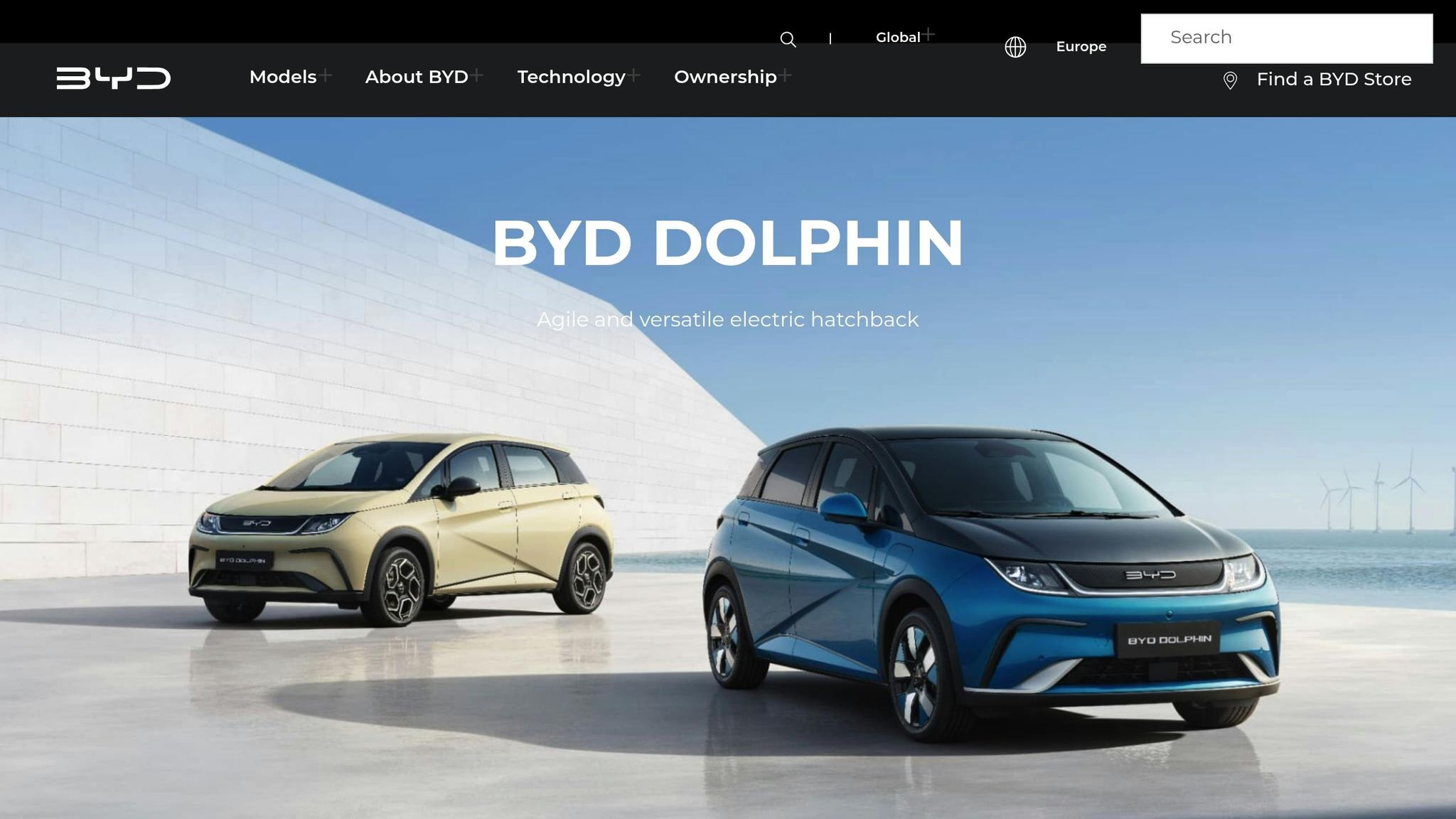
After exploring the Tesla Model 3, let’s turn to the BYD Dolphin – a compact and budget-friendly option for urban electric mobility. Hailing from China, this EV is known for its practical design, affordable pricing, and dependable performance, especially in city settings. It’s an attractive choice for anyone looking to dip their toes into electric vehicles without venturing into luxury territory. Below, we’ll dive into its range, pricing, and how it fits into Togo’s urban landscape.
Range (miles/kilometers)
The BYD Dolphin Active model offers a combined range of 195 miles (314 km) under normal conditions, stretching up to 308 miles (495 km) in city driving. However, range can fluctuate based on temperature: colder weather may reduce it to about 180 miles (295 km), while milder conditions can extend it to around 250 miles (400 km).
Green NCAP testing revealed slightly different results, estimating an average range of 227 miles (365 km). For shorter urban trips, it could even reach up to 298 miles (480 km).
Pricing (USD and Estimated Import Cost)
The BYD Dolphin comes with an attractive price tag, ranging from $13,900 to $18,000. For Togolese buyers, additional costs include shipping fees of roughly $1,202 to $1,429 from the USA to Lomé. On top of that, local import charges typically range between $1,500 and $2,500, along with a $175 fee for the BESC document per vehicle.
Here’s the good news: Togo exempts electric vehicles from the usual 53.5% import duty. However, this exemption isn’t automatic – it requires approval from the Ministries of Environment and Trade, in collaboration with the Togolese Revenue Office.
Suitability for Togo (Urban/Rural Use, Road Conditions, Climate)
The BYD Dolphin shines in urban areas like Lomé. Its compact size makes navigating narrow streets and finding parking a breeze. Plus, its suspension does a good job of handling uneven roads, keeping rides smooth and stable, even when taking corners.
While the base Dynamic model performs admirably in city environments, it’s less suited for highways or rugged rural roads. As for range, Togo’s tropical climate may influence performance, so it’s something to keep in mind.
"The BYD Dolphin might just hit the sweet spot for buyers who want a usable electric car without breaking the bank. It’s got enough space to be practical, enough tech to feel modern, and just enough character to stand out."
For urban commuters in Togo, the Dolphin offers a practical and economical solution.
Charging Infrastructure Compatibility
The BYD Dolphin supports standard charging protocols, making it compatible with most Level 2 charging stations. Its strong city range means that most owners can simply charge it overnight at home, reducing the need for public charging stations.
3. Hyundai Kona Electric
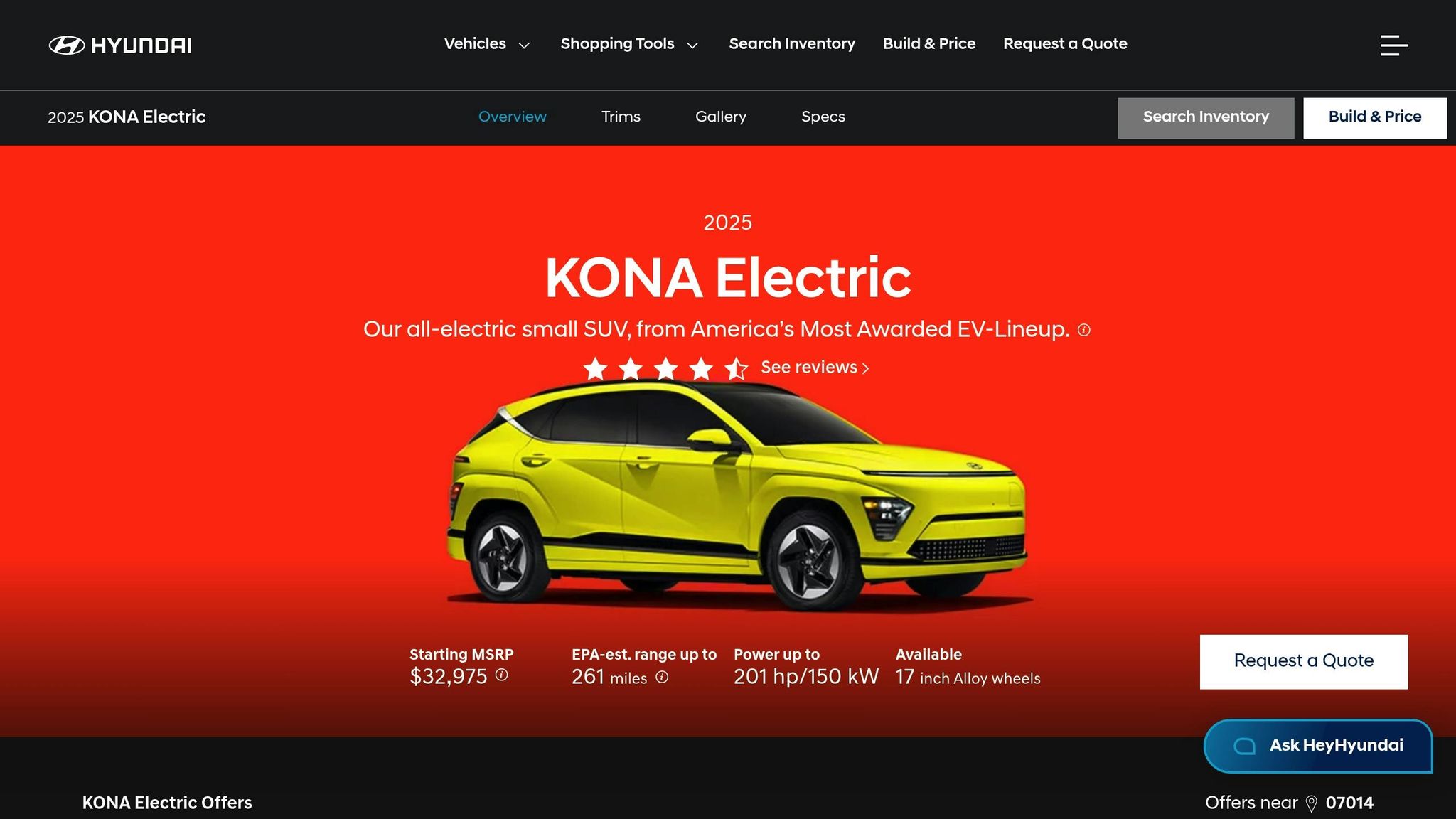
For buyers in Togo looking for a vehicle that balances affordability and performance, the Hyundai Kona Electric stands out as a smart choice. This compact crossover SUV combines practicality with cost-effectiveness, offering a reliable option for those venturing into electric vehicles (EVs). Known for its impressive range and adaptable design, it’s a great fit for drivers who want dependable performance without breaking the bank.
Range (miles/kilometers)
The Hyundai Kona Electric, equipped with a 65 kWh battery, delivers varying range results depending on weather conditions. In mild weather, it can achieve up to 360 miles (579 km) in urban settings and 220 miles (354 km) on highways. In colder climates, the range decreases to 235 miles (378 km) in the city and 170 miles (274 km) on highways.
In a controlled test conducted in Madrid, the Kona Electric managed to cover an impressive 790 kilometers (491 miles) in an urban cycle on a single charge.
"This record-breaking test goes to show that our environmentally friendly, all-electric SUV, KONA Electric, exceeds expectations for everyday driving. Here’s proof that Hyundai Motor is a leader in electromobility, and that range should no longer be a reason not to switch to a BEV."
– Andreas-Christoph Hofmann, Vice President Marketing & Product at Hyundai Motor Europe
While range is a key feature, pricing is another crucial factor for buyers in Togo.
Pricing (USD)
The 2025 Hyundai Kona Electric offers multiple trims to cater to different budgets. The base SE trim starts at $34,470, while the SEL trim is priced at $36,975. For those looking for sportier features, the N Line trim comes in at $38,375, and the top-tier Limited trim is available for $41,150. These price points make the Kona Electric an attractive and competitive option for Togolese buyers.
Suitability for Togo (Urban/Rural Use, Road Conditions, Climate)
The Kona Electric’s crossover design makes it a versatile pick for Togo’s varied terrain and road conditions. It performs well in urban environments and is suitable for moderate intercity travel, earning a long-distance rating of 2.5/5. Its efficiency is best realized in mild tropical climates, aligning with Togo’s weather patterns and addressing potential climate-related challenges.
Charging Infrastructure Compatibility
The Hyundai Kona Electric is compatible with a range of charging solutions, making it adaptable to Togo’s expanding EV infrastructure. It supports:
- Level 1 charging: Using a standard 120V outlet, which takes about 60 hours for a full charge.
- Level 2 charging: At 240V, it recharges in under 10 hours using the universal J1772 connector.
- DC fast charging: With the SAE Combo (CCS) connector, it can reach 80% charge in approximately 54 minutes.
For most drivers in Togo, home charging will cover daily needs, while the country’s growing public charging network will enhance convenience for longer trips. This flexibility ensures the Kona Electric is a practical choice for both city and intercity travel.
sbb-itb-99e19e3
4. Leapmotor T03
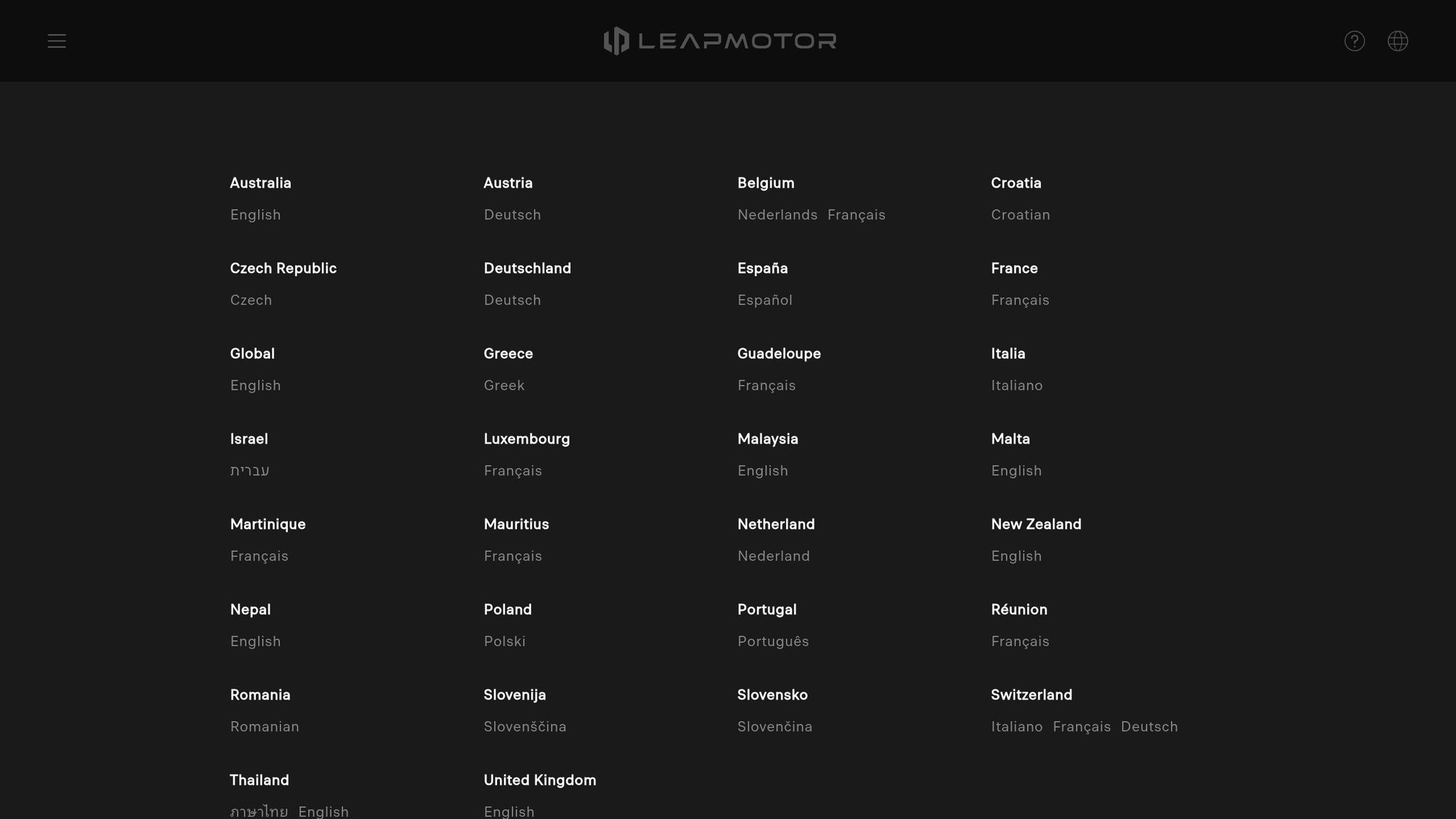
For buyers in Togo looking for an affordable entry into the electric vehicle market, the Leapmotor T03 is a standout choice. This compact city car is one of the most budget-friendly EVs available for import, offering basic electric mobility at a price that won’t break the bank.
Range (miles/kilometers)
The Leapmotor T03 comes equipped with a 37.3 kWh battery pack, delivering a WLTP combined range of 265 km (165 miles). In favorable conditions, like Togo’s warm tropical weather, the range can extend to 345 km (214 miles) for city driving and 205 km (127 miles) on highways. In colder climates, the range drops to 225 km (140 miles) in urban settings and 160 km (99 miles) on highways. With an energy efficiency rating of 3.8 miles per kWh, the T03 performs well for its price point, making it a competitive option in the budget EV category.
Pricing (USD and Estimated Import Cost)
The T03 is priced with affordability in mind. Its base MSRP is approximately $9,934, while the EXW price – factoring in inspection, export handling, and banking transfer fees – comes to about $10,784. However, this price does not include domestic logistics, containerization, international freight, or import duties and taxes. Given Togo’s relatively favorable import duty conditions, the T03 remains a cost-effective option for budget-conscious buyers.
Suitability for Togo (Urban/Rural Use, Road Conditions, Climate)
The T03’s compact dimensions make it a practical choice for Togo’s urban environment. Measuring 3,620 mm (142 in) in length, 1,652 mm (65 in) in width, and 1,577 mm (62 in) in height, it’s perfectly suited for navigating crowded city streets. However, its limited range and modest design may pose challenges for longer rural drives or rougher terrains.
Togo’s tropical climate is generally favorable for battery performance, although extremely high temperatures could slightly impact range. The vehicle’s liquid heat management system helps maintain efficient battery operation in such conditions.
"A competent if charmless car, the T03 proves cheap doesn’t always mean nasty and should worry Dacia" – Autocar
Charging Infrastructure Compatibility
The T03 supports both AC and DC charging options. A 6.6 kW Type 2 AC charger can fully charge the battery in about 6.5 hours, while a 48 kW CCS DC fast charger can bring the battery from 10% to 80% in roughly 53 minutes.
5. Toyota bZ4X
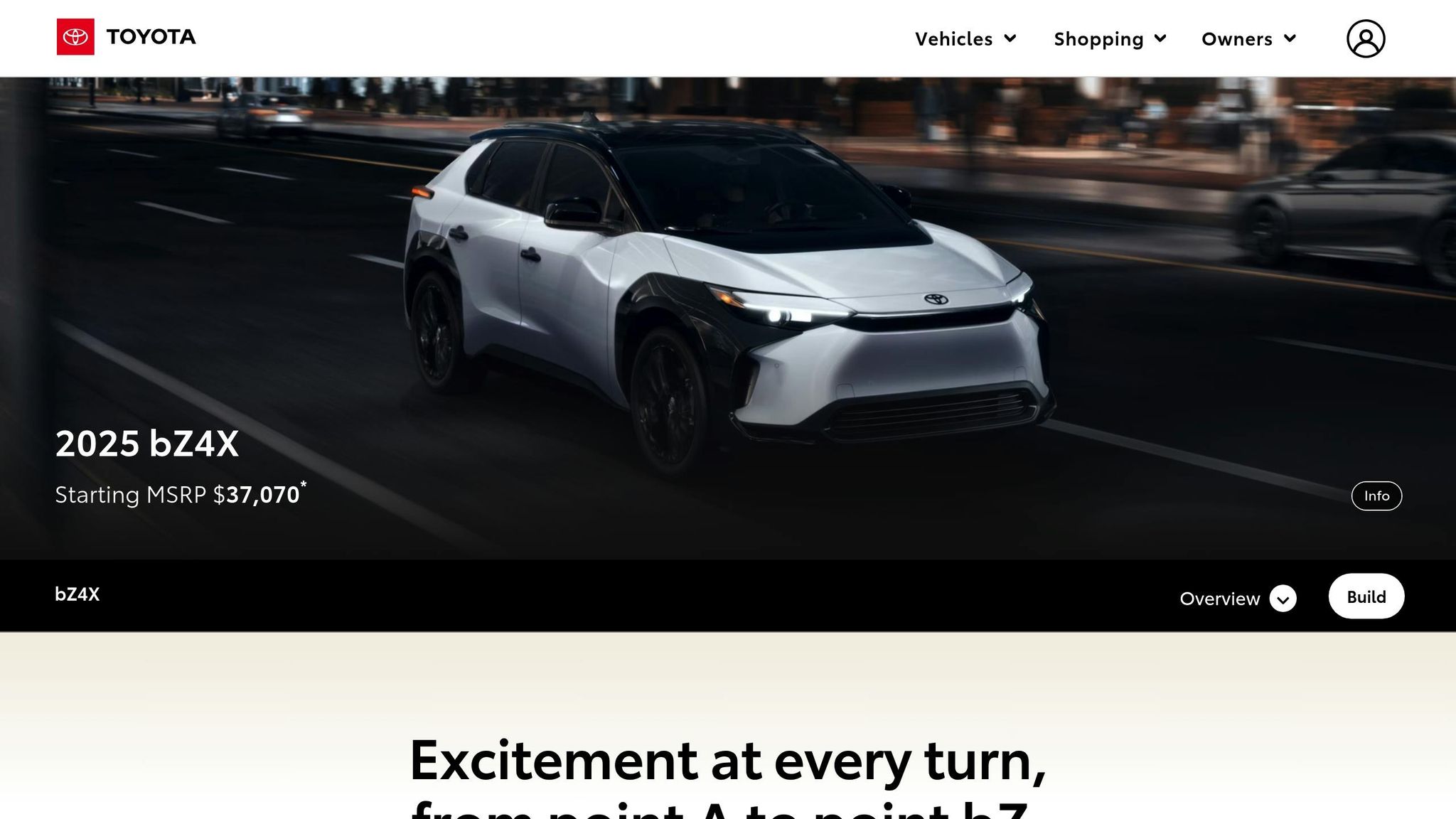
The Toyota bZ4X marks the brand’s foray into the electric SUV market, combining spacious comfort with the reliability Toyota is known for. This mid-size electric SUV is tailored for drivers who value practicality and a dependable driving experience. With Togo’s growing interest in electric vehicles, the bZ4X offers a balance of space and trusted performance that aligns well with the country’s needs.
Range (miles/kilometers)
The bZ4X is available in both front-wheel drive (FWD) and all-wheel drive (AWD) configurations, each offering different range capabilities. The FWD model provides an EPA-estimated range of up to 252 miles (406 km), while the AWD version delivers up to 228 miles (367 km). In terms of efficiency, the FWD achieves an EPA-estimated 119 MPGe combined, with the AWD version at 104 MPGe combined. This range and efficiency make it a practical option for urban commutes and shorter intercity trips within Togo.
However, real-world tests reveal some limitations. During a highway range test by Car and Driver, the dual-motor AWD Limited model managed 160 miles (257 km) before running out of charge. While suitable for city driving and moderate distances, rural trips may require careful planning to account for charging stops.
Pricing (USD and Estimated Import Cost)
The 2025 Toyota bZ4X starts at $38,465 for the base model, with higher trims and added features pushing the price up to $43,195. This positions it competitively within the electric SUV market. For comparison:
- Hyundai Ioniq 5: $44,200
- Kia EV6: $44,375
- Chevrolet Equinox EV: $34,995
When importing to Togo, additional costs like shipping, customs duties, taxes, and local fees will increase the final price, making it important for buyers to factor in these expenses.
Suitability for Togo (Urban/Rural Use, Road Conditions, Climate)
Built on Toyota’s e-TNGA platform, the bZ4X delivers stable handling and dependable performance. The AWD version includes X-MODE, which improves traction on uneven or slippery surfaces.
"Smooth ride, spacious cabin, peppy around town" – Car and Driver
In urban areas, the bZ4X shines with its roomy interior and comfortable ride quality. However, its limited range could be a challenge in rural regions where charging stations are scarce. On the bright side, Togo’s warm climate is favorable for battery efficiency, though longer journeys will still require thoughtful charging plans.
Charging Infrastructure Compatibility
The bZ4X supports both Level 1 and Level 2 AC charging with a standard J1772 connector and DC fast charging via a CCS1 connector. Charging times depend on the method:
- Level 1 (household outlet): Approximately 50 hours for a full charge (roughly 4 miles of range per hour).
- Level 2 (home or public station): Around 9.5 hours for a full charge (adds 20–25 miles of range per hour).
- DC fast charging: Recharges the battery from low to 80% in about 30–35 minutes.
Toyota’s app helps locate public charging stations and manage payments, making it easier for drivers to navigate their charging needs. To maximize battery health, it’s recommended to limit frequent use of DC fast charging and rely on AC charging for routine needs.
"The Toyota bZ4X comes up short in the all-important driving-range metric, which sorely compromises an otherwise pleasant electric SUV" – Car and Driver
While the bZ4X’s range may not lead the pack, its reliability and comprehensive charging solutions make it a viable option for Togo’s emerging EV market, especially in urban areas with growing infrastructure.
Electric Vehicle Comparison for Togo
Picking the right electric vehicle (EV) comes down to your budget, driving habits, and what you need from your car. Here’s a breakdown of five EVs that stand out in Togo’s market:
| Vehicle | Starting Price (USD) | Range | DC Fast Charging (0–80%) | Best Use Case | EV24.africa Availability |
|---|---|---|---|---|---|
| Tesla Model 3 | $44,130 | 272–358 miles (438–576 km) | ~30 minutes | Urban professionals, tech-savvy drivers | Available |
| BYD Dolphin | ~$15,000–20,000 | 211–265 miles (340–427 km) | ~30 minutes | Budget-friendly city driving | Available |
| Hyundai Kona Electric | $34,425 | 258 miles (415 km) | ~45 minutes | Urban families, compact SUV needs | Available |
| Leapmotor T03 | ~$10,000–12,000 | 186 miles (300 km) | ~40 minutes | First-time EV buyers, city commuting | Available |
| Toyota bZ4X | $38,465 | 228–252 miles (367–406 km) | 30–35 minutes | Dependable, moderate range needs | Available |
Now, let’s dive into what makes each of these EVs a good fit for different drivers and lifestyles in Togo.
The Tesla Model 3 stands out with its advanced tech features and impressive range, making it a top choice for intercity travel and drivers who prioritize premium experiences. If you’re looking for affordability, the Leapmotor T03 and BYD Dolphin offer excellent entry points into EV ownership. The T03 is perfect for short city commutes, while the Dolphin provides a bit more room for passengers or cargo. Both models also benefit from Togo’s tax exemptions on EVs, making them even more cost-effective.
For those after a balance between price and performance, the Hyundai Kona Electric delivers. With its 258-mile range and compact SUV design, it handles Togo’s diverse road conditions well. However, its slightly longer charging time might require some planning for extended trips.
The Toyota bZ4X is a solid pick for buyers who value reliability and practicality. While its range is shorter compared to the Tesla Model 3, it’s well-suited for urban and moderate intercity travel. Plus, its fast charging can add about 100 miles in just over 20 minutes, which is handy for quick stops.
City dwellers will find the BYD Dolphin and Leapmotor T03 especially appealing. Their compact sizes make parking a breeze, and they easily meet the day-to-day needs of urban driving. Excitingly, Togo is expanding its EV infrastructure, highlighted by the launch of an automated battery swap station in Lomé.
"We are excited to launch the first Automated Battery Swap Station in Togo, a significant development in our mission to enhance electric mobility across Africa", said Rahul Gaur, Head of Spiro Togo.
For rural or intercity travel, vehicles with longer ranges – like the Tesla Model 3 or Toyota bZ4X – help ease concerns about running out of charge on longer journeys.
Charging compatibility is another consideration. The Tesla Model 3 benefits from a well-established global charging network, but all these vehicles align with Togo’s growing infrastructure. Staying informed about local charging options will ensure a smooth EV experience.
All five models are available through EV24.africa, which also offers financing options to make EV ownership more accessible. Whether you’re prioritizing premium features, affordability, or a balanced mix of performance and reliability, there’s an EV here for you. The choice ultimately comes down to what fits your lifestyle and driving needs.
Conclusion
Right now is an ideal moment to consider importing an electric vehicle (EV) into Togo. The Togolese government has rolled out attractive incentives, including VAT and customs duty exemptions for fully electric vehicles. These measures make EVs more affordable while encouraging cleaner transportation and helping to reduce the country’s carbon footprint.
EV24.africa simplifies the entire process of importing an EV, offering a selection of over 200 models from more than 25 global brands. This includes the five vehicles highlighted in this guide, ranging from the budget-friendly Leapmotor T03, priced around $10,000, to the premium Tesla Model 3 at $44,130. With delivery available to all 54 African countries in just 4–8 weeks via the Port of Lomé, the service ensures your EV arrives quickly and efficiently. Their dedicated team provides end-to-end support, covering everything from sourcing and customs clearance to local registration. Financing options are also available, making the transition to electric mobility even smoother.
As Togo continues its push toward sustainable transportation, the EV market is expected to grow significantly, with government policies projected to double EV imports by 2025. Whether you’re looking for an economical city car like the BYD Dolphin, a practical family SUV like the Hyundai Kona Electric, or a tech-savvy option like the Tesla Model 3, switching to an EV now not only offers great value but also helps shape a cleaner, more sustainable future for Togo.
FAQs
What steps do I need to follow to import an electric vehicle into Togo?
How to Import an Electric Vehicle into Togo
Bringing an electric vehicle (EV) into Togo involves several important steps. First, you’ll need to secure an import permit and gather the necessary paperwork. This includes the original title, registration, bill of sale, and proof of insurance. Additionally, you’ll need to declare the vehicle to Togo Customs and confirm its origin.
One major advantage of importing an EV is that electric vehicles are exempt from import taxes, unlike traditional vehicles that face customs duties ranging from 5% to 20%. This makes EVs an appealing choice for cost-conscious buyers.
It’s also essential to ensure the vehicle meets local safety and emissions standards. To protect the car during transit, shipping it in a container is highly recommended. Once your EV arrives in Togo, double-check all documentation to ensure a smooth customs clearance process.
By following these steps carefully, you can simplify the process and avoid unnecessary delays or complications.
How does Togo’s hot climate impact the range and performance of electric vehicles?
Togo’s tropical climate, where temperatures frequently surpass 95°F, poses unique challenges for electric vehicles (EVs). Intense heat can speed up battery degradation, diminish energy storage, and reduce power output. In extreme cases, this can lead to a drop in driving range by as much as 30%.
On top of that, using air conditioning to combat the heat places additional strain on the battery, further shortening the distance an EV can travel between charges. For EV owners in Togo, choosing models equipped with advanced thermal management systems is a smart way to maintain performance and ensure the vehicle can handle the high temperatures efficiently.
What factors should I consider when selecting an electric vehicle for both city and rural areas in Togo?
When choosing an electric vehicle (EV) for both city and rural driving in Togo, there are a few key features to keep in mind:
- Charging options: In rural areas where charging stations might be scarce, an EV that allows at-home or workplace charging can make life much easier. This ensures you’re not stuck searching for a charging point in less developed regions.
- Driving range: Look for a model with a long battery range. This is crucial for handling extended trips, particularly in areas with fewer charging stations along the way.
- Durability: Togo’s warm climate can take a toll on EV batteries and overall performance. Choose a vehicle specifically built to handle high temperatures for better reliability.
By focusing on these aspects, you can find an EV that handles the challenges of both urban commutes and rural adventures in Togo.


